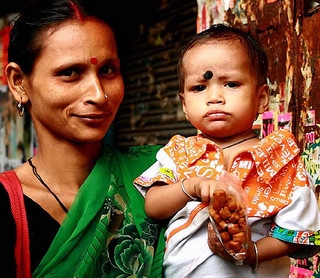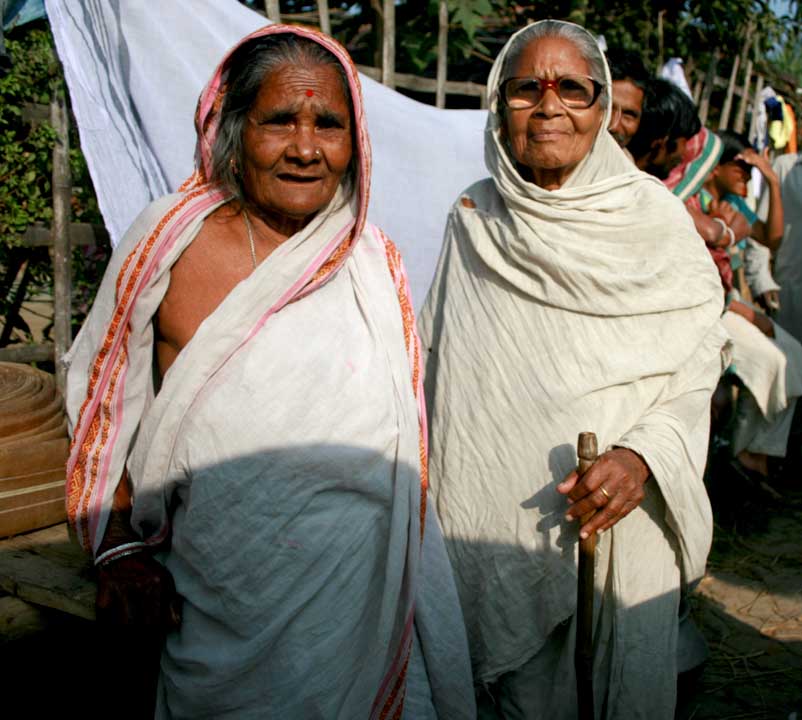What if I was Maria?
 As founder of The 50 Million Missing, a campaign on female gendercide in India, I am often asked by individuals if there is anything they can do to make a difference.
As founder of The 50 Million Missing, a campaign on female gendercide in India, I am often asked by individuals if there is anything they can do to make a difference.
And my response is, “Yes, you can! Just be responsible for what YOU say, and what YOU do.”
Let me explain with Maria’s story.

Maria del Nevo who recently passed away in June 2012, was a British woman who in the 90’s had lived and worked in Pakistan. Her account of her experiences there are included in a selection of letters from various women, published under the title ‘Letters from the Edge.’ However, this is not a story about a westerner encountering a facet of the South Asian culture. Maria’s story is applicable to anyone who sees themselves as standing on the edge of the female gendercide. Not participating in it, but witnessing the cultural dynamics that propel it, and feeling helpless. Maria’s story therefore applies equally to Indians (or Pakistanis) who would never demand a dowry or support female infanticide or feticide. But they would still respond the same way that Maria did if they visited the house Maria did in this story!
While living in Pakistan, Maria was invited for a few days as a house-guest to a friend’s home. It was a joint family, and Rani, the daughter-in-law, was expecting her first child. Maria explains that Rani was very anxious about the sex of her unborn child. She says, “[Rani] is always frightened her husband won’t come back to her one day. She thinks if she gives him all boys, he is tied to her and she will gain more respect from him and his family.”
Eventually Rani’s worst fears were realized and she gave birth to a girl. However, the baby did not survive and the labor took a toll on Rani’s health. For the next two days, she lay in the hospital bleeding. Rani’s husband and in-laws however did not visit her for the birth of the child, or upon receiving news of her death and Rani’s critical condition. Instead the entire family stayed home, and tried to entertain their house-guest Maria by renting Hollywood videos to watch, which they presumed she would enjoy.
Maria however, could hardly watch the videos, and felt extremely uncomfortable with the whole situation. Even later, when Rani returned home, the family isolated her in a room. No one talked to her or tried to comfort her, and they also warned Maria to stay away since they believed Rani carried ‘bad luck.’ Maria complied with their wishes, and explains it like this: “Although I thought this strange, I didn’t feel my questioning would be appreciated…I was the family’s guest and I didn’t wish to offend them by blatantly acting against their wishes.”
What Maria felt and did is what most in her situation would do, whether they are visiting westerners, or whether they are Indians, visiting friends and relatives, who perhaps themselves wouldn’t do what Rani’s family did to her.
A majority of people, like Maria, will stay quiet, won’t object, and will do nothing – because they don’t want to offend.
But ask this: Who do they not wish to offend? Rani’s family that is abusive towards her? Or Rani, the victimized woman?
Ask this: Why are we more concerned about hurting the feelings of the more powerful and oppressive party? Why are we not worried about hurting the feelings of the weaker and oppressed party – women like Rani?
Maria struggled with her conscience and realized the hypocrisy of her own reasoning. She says, “The family’s behavior and superstition made me angry. Rani had no comfort, no love, no husband by her side….” Rani did not even receive Maria’s comfort and support. Not a hug. Not a kind word. Not even a smile.
So why didn’t Maria make that little gesture towards Rani? And so what if she did offend Rani’s family by doing that? The worst thing that could have happened is they would be offended. They would withdraw their friendship and hospitality. Is that that a big sacrifice to make?
Maria’s small gesture of compassion may not have changed the course of Rani’s life, but in that moment of darkness, wouldn’t there be just a little respite for her? Something she would cherish for long? Isn’t that something that we would each want for ourselves if we were in Rani’s place and everything seemed hopeless?
Maria finally comes to term with her choice. In her words, in the darkness that was Rani’s life “I had stayed on the side of the majority.”
 Rita Banerji an author and gender activist, and the founder of The 50 Million Missing Campaign to end India’s female genocide. Her book ‘Sex and Power: Defining History Shaping Societies,‘ is a historical and social look at how the relationship between gender and power in India has led to the ongoing female gendercide. Her website is www.ritabanerji.com She blogs at Rebellions in my Space and tweets at @Rita_Banerji
Rita Banerji an author and gender activist, and the founder of The 50 Million Missing Campaign to end India’s female genocide. Her book ‘Sex and Power: Defining History Shaping Societies,‘ is a historical and social look at how the relationship between gender and power in India has led to the ongoing female gendercide. Her website is www.ritabanerji.com She blogs at Rebellions in my Space and tweets at @Rita_Banerji
The views expressed by guest contributors to the “It’s a Girl” blog represent the opinion of the individual author who contributes the content and should not be interpreted as being endorsed or approved by Shadowline Films. We feature these contributions to foster dialogue and exchange on gendercide and invite our readership to join the discussion.
